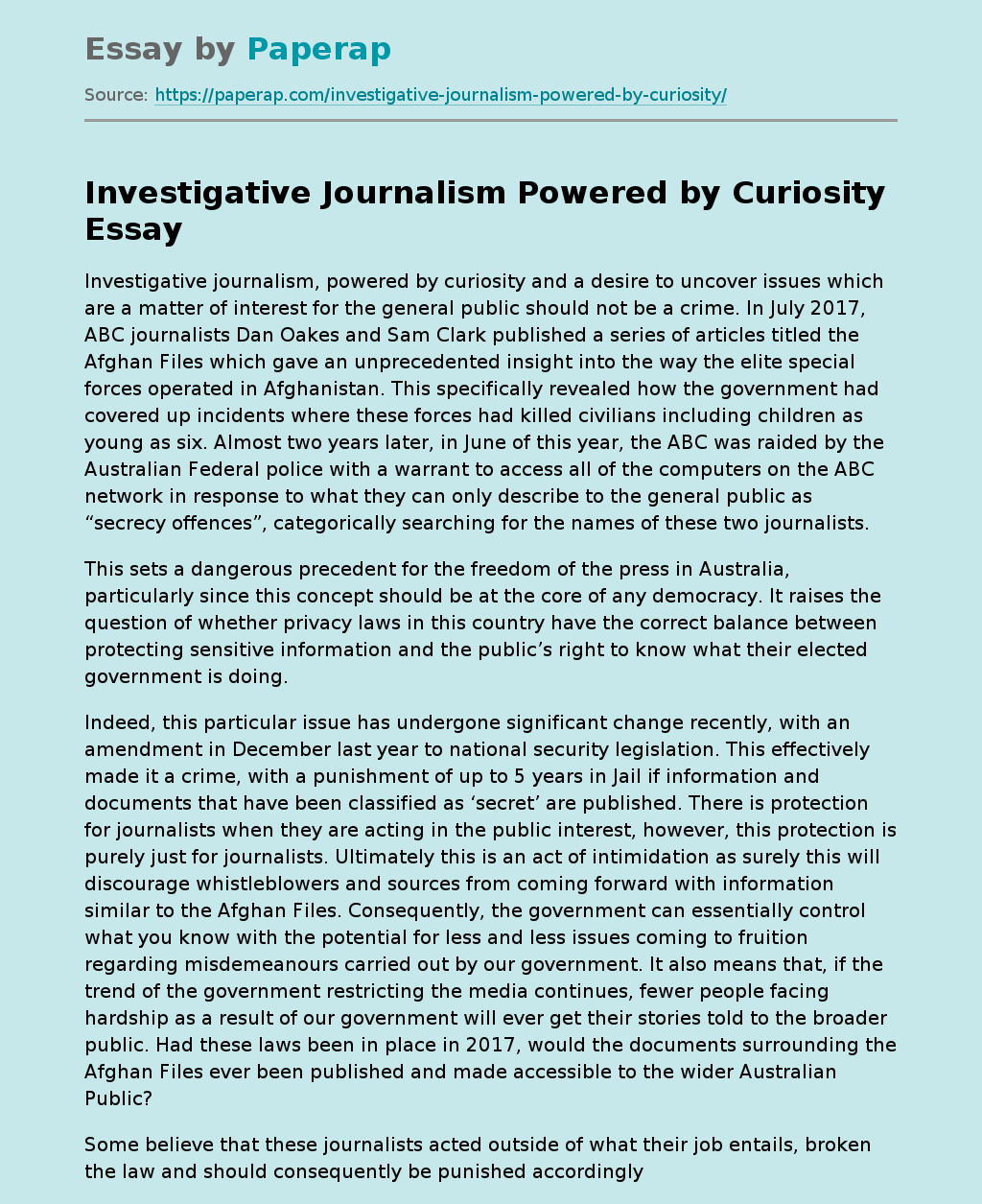Investigative Journalism Powered by Curiosity
The following sample essay focuses on investigative journalism and what drives it. Read the introduction, body and conclusion of the essay, scroll down.
Investigative journalism, powered by curiosity and a desire to uncover issues which are a matter of interest for the general public should not be a crime. In July 2017, ABC journalists Dan Oakes and Sam Clark published a series of articles titled the Afghan Files which gave an unprecedented insight into the way the elite special forces operated in Afghanistan.
This specifically revealed how the government had covered up incidents where these forces had killed civilians including children as young as six. Almost two years later, in June of this year, the ABC was raided by the Australian Federal police with a warrant to access all of the computers on the ABC network in response to what they can only describe to the general public as “secrecy offences”, categorically searching for the names of these two journalists.
This sets a dangerous precedent for the freedom of the press in Australia, particularly since this concept should be at the core of any democracy.
It raises the question of whether privacy laws in this country have the correct balance between protecting sensitive information and the public’s right to know what their elected government is doing.
Indeed, this particular issue has undergone significant change recently, with an amendment in December last year to national security legislation. This effectively made it a crime, with a punishment of up to 5 years in Jail if information and documents that have been classified as ‘secret’ are published.
There is protection for journalists when they are acting in the public interest, however, this protection is purely just for journalists. Ultimately this is an act of intimidation as surely this will discourage whistleblowers and sources from coming forward with information similar to the Afghan Files. Consequently, the government can essentially control what you know with the potential for less and less issues coming to fruition regarding misdemeanours carried out by our government. It also means that, if the trend of the government restricting the media continues, fewer people facing hardship as a result of our government will ever get their stories told to the broader public. Had these laws been in place in 2017, would the documents surrounding the Afghan Files ever been published and made accessible to the wider Australian Public?
Some believe that these journalists acted outside of what their job entails, broken the law and should consequently be punished accordingly as nobody should be above the law. However, as human rights barrister, Geoffery Robertson illustrates “democracy depends” on journalists having “special rights”. A free press is vital for an informed society and is what generates a healthy debate. Often what informs our choices when it comes to elections is the press.
The public deserves to know about the Australian Taxation Office’s “toxic internal culture” and how it specifically targeted the debt collection of vulnerable small businesses in order to meet their own revenue targets. Or the fact that the Commonwealth Bank’s financial planning sector had a culture which was focused on profit at all costs. The end result being $30 million being paid back to 300 small businesses and over 10,000 submissions to the Royal Commission.
Both of these examples started with a report from the ABC and the only reason this information is available is through whistleblowers having the ability to come forward with information.
Furthermore, the more restrictive laws and the more raids there are on the media, Australia will only fall further behind other, more progressive countries. Since the start of this year, we have already fallen behind four countries in 2019 according to the World Press Freedom Index. Indeed, according to constitutional lawyer George Williams, “Australia is the only democracy in the world” that does not explicitly protect freedom of the press in the constitution. This is in conjunction with Freedom House, an “independent watchdog for the expansion of democracy worldwide”, highlighting that press freedom is in a “downward spiral” globally.
Ultimately, whether it be in the form of a Bill of Rights or further changes to national security legislation, there must be more protection for journalists. No one deserves to be intimidated and prosecuted for simply making the public aware when our government has tried to hide its own shameful mistakes. Our country relies on it.
Investigative Journalism Powered by Curiosity. (2021, Feb 10). Retrieved from https://paperap.com/investigative-journalism-powered-by-curiosity/

